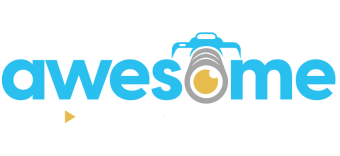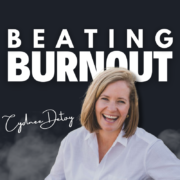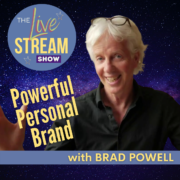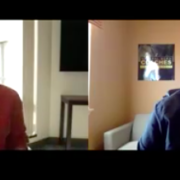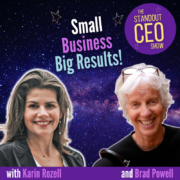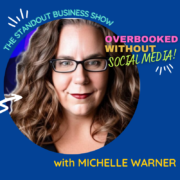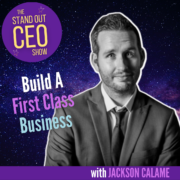136. Tired? Distracted? Burned-out? Listen to this – with Cydnee Detoy
Feeling a bit overwhelmed lately?
Has the holiday season left you a bit ragged, and now that the new year is kicking in, you feel like there’s no time to rest?
And so, do the things you used to enjoy doing at home and work seem impossible now?
Well, join the club.
Here’s the truth: if you want to build a standout business, you’ve got to learn how to keep burnout at bay.
Even if you’re only on the edge of overwhelm, listen up because executive coach, Cydnee DeToy, is joining me to unravel the complex tapestry of burnout that many of us entrepreneurs face.
This conversation is a masterclass in crafting a life that not only withstands burnout but can redefine your relationship with work…
so you’re transformed from frustrated & fatigued to energized & thriving!
SUBSCRIBE TO THE PODCAST:
Episode Resources
Connect with Cydnee Detoy
Learn how to stand out in crowded market by bringing more personality into your marketing:
Join the FREE Authenticity Code Masterclass, January 17, 2024
Transcript
Cydnee Detoy:
The pressure we put on ourselves, the expectations we hold ourselves to as business owners. It’s the way we tie our identity to the success, the failures, the ups and downs of the business. It’s a desire, a need to be everything to all people and an unwillingness or discomfort to set boundaries when we’re trying to serve our clients. You are feeling overwhelmed, you’re to do less, to sew on, like you have to hustle, and then you feel like the only way to rest and recharge is take a break, sit on the couch, watch some Netflix and just veg.
Brad Powell:
Welcome to the Standout Business Show. I’m Brad Powell, and today we are talking about the secrets to beating burnout. So here is what I’d like you to notice, like right now. Have you been feeling a little overwhelmed lately, you know? Is your work running your ragged or making you feel like you’ve got no time to rest or take a break? Do the things you used to enjoy doing, whether it was at home or at work? Do they seem like impossible to make time for now? So if you’re feeling any of that stuff, guess what, join the club, because this could be what our new normal is starting to look like for most of us, even if you’re only feeling like you’re on the very edge of overwhelm. I want you to listen up to this episode, because today’s guest is executive coach Sydney Dutoy, and she’s going to be sharing her tricks and tips and lessons that can free you from burnout and redefine your relationship with work. So if that sounds good, stay tuned, don’t touch that dial. And with that let’s start the show. All right, sydney, welcome to the show.
Cydnee Detoy:
Thank you, brad, so good to be here.
Brad Powell:
Yeah. So let’s talk about burnout. It’s a happy topic, yeah, but I also think it’s super timely. The entire world is in this post COVID recovery mode of. We don’t even realize how stressful and overwhelmed we’ve been. We haven’t really dealt with a lot of the stuff that happened to all of every one of us. That like the worldwide global experience of, oh my God, this was really not good, and so whatever you were feeling and how, whatever state of mind you were like before, three years ago, now it’s really been challenged and changed. And so there’s this leading edge of burnout is like, yeah, life has been burning me out, feeling that it’s just super pervasive and no matter who you are old, young, experience, no experience, that just sort of like we’re dealing with that. When you look at the landscape of humankind and human emotion and how we sort of go up and down in that stuff, what are you seeing and how do you relate and define to it when you’re talking about burnout?
Cydnee Detoy:
Yeah, brad, it’s such a good point about the lasting impact of the pandemic. I feel like when we got to 2023, everyone needed and deserved a three-month sabbatical, just a full break, a full pause to regroup, to heal, to recharge. So might not be possible, but definitely I’m with you on that. The impact of the pandemic cannot be understated. When it comes to burnout, and I think what you described to the nail in the head, there’s all of these external factors and there are things that we can be conscious of, we can point to in the world around us, and there is the macro environment of the pandemic. There’s the workload, there’s the people we’re working with, maybe the tacit dynamics with co-workers, bosses, team members, family members.
Cydnee Detoy:
Maybe there’s tasks that are burning us out, and then you said there’s these things around the holidays and just pressure. Then I think there’s this piece that is understated or underappreciated and that’s what’s going on internally with our mindset and it’s the pressure we put on ourselves, the expectations we hold ourselves to as business owners. It’s the way we tie our identity to the success, the failures, the ups and downs of the business. It’s a desire, need to be everything to all people and an unwillingness or discomfort to set boundaries. When we’re trying to serve our clients, we’re trying to push a new product out into the world. The most important thing before we can tackle or solve burnout is to recognize that there’s these external factors and then there’s a lot of internal dynamics going on. Those two come together to create this lovely compounding effect of burnout.
Brad Powell:
Yeah, when it comes to our work life, I feel like, throughout all the different work situations that I’ve been in, especially the ones that I’ve been that are of my own, making my own business that.
Brad Powell:
I created. I have come to the edge of burnout, struggling with not totally getting knocked over and ending up in that toaster burn I’ve been there and I could easily go there again is the way it feels like being in that place of like oh my gosh, I just don’t think I can do this anymore. That sort of heavy feeling and that the relationship that you have with the tasks that are before you put you in a form of misery, like you’re just miserable, yeah, like how did I get here and how do I get out of it? Or it feels like there’s no way to get out of this, like I’m really trapped, that feeling of being stuck and trapped and in misery that it’s very painful. And so I want to sort of approach this from two directions. One is there are people who are in that place right now.
Cydnee Detoy:
Yeah.
Brad Powell:
And so there’s some things that they can do. Hopefully that will help them move out of that that state of being. But for most of the rest of us, we’re in this more middle ground of it could happen to any one of us. We could be closer than we think to burnout, and so there’s more of a maintenance mode of what can we be doing so that, first of all, we recognize the symptoms and then, when we do go oh yeah, I, you know, like, don’t step on that third rail because you’ll burn out. Like what are the third rails that people should be watching out for?
Cydnee Detoy:
Yeah, I just I am feeling the feeling, the response, because I do think so many of us are in this like so close, so close on the edge of burnout. I think that it may be counterintuitive, but one of the things that I suggest to people is get a passion project, get a something that you are so excited to do that you just can’t stop. And there’s always this hesitation when you are feeling overwhelmed, you’re too do, list is so on. You are just feeling so incredibly like you have to hustle, and then you feel like the only way to rest and recharge is to take a break, sit on the couch, watch some Netflix and just veg. And so you’re probably listening to me say like get a hobby, get a passion, do something. And absolutely cringing, saying I absolutely cannot do anything more.
Cydnee Detoy:
And the reason I say that is because the having a hobby or a passion does a couple of things. It gives you purpose outside of work, so it gives you another place to focus your extra mental energy. It gives you a level of satisfaction and fulfillment and bolsters your self worth. So your self worth is not so tied up in the highs and lows of your business or your job, and then it’s going to also naturally replenish your energy, and so it’s going to be like this like your your on low battery, you plug your phone into one of those high powered superchargers, it’s going to give you an immediate bolt or shock. That’s going to balance out some of the dreams that you’re feeling in your day to day life if you just are doing work and then trying to just chill or rest outside of work. Got other tips, but I think that’s the number one that I would start with.
Brad Powell:
Yeah, well, I really like the idea I would even put in the context of rather than think of it as a hobby or a project just finding something fun that you just really like doing for pleasure. Yeah, you know, like for me, I like riding my bike and I do it as often as I can, as long as the weather allows, and I like dancing. For quite a while I used to go to this Samba Brazilian Samba class, and just happened once a week on a Saturday. It was a form of working out. You know, it was good exercise, but it never felt like a workout, like it was just totally fun. And I honestly think that the Brazilians have a secret that the rest of us need to learn, which is when you do this movement, like it’s your hips going sideways and up and down and all around like this.
Brad Powell:
It’s kind of like you’ve taken your body and you’ve pulled the string on a top and the top is just going like this, you know, and it’s just doing this for like an hour and a half. And when you do that, like, and it’s in your core, in your middle, you come out of it just going, oh my gosh, like I could just float around like this for you know, the next two weeks. Like you just come out with this big smile on your face and you feel totally energized. No matter what I was feeling when I woke up on Saturday mornings, I would come away from this class just on a super natural body high.
Cydnee Detoy:
So funny that you talked about dance, brad, because I used to. For the entirety of 2022, I went to a dance class every Tuesday morning and I had absolutely no attachment to being good at it, to falling along. Just let myself truly, truly be in the moment, and there was something that was so, so freeing about not having to worry about being excellent or being perfect or even mastering something in the way that I do in my professional life, but truly just be in the moment and appreciate the movement and have a little fun. So dance, definitely. One of them apparently dances a number one tip for people listening to this this morning.
Cydnee Detoy:
I also am an avid, avid reader and I really give myself permission to read just pure indulgent fiction. So I think I’ve read 30 or 35 books this year and their romantic comedies, romance novels, historical fiction, anything that just gives me real ability to just escape, let my imagination, my creativity wander. And then I have been, I would say, an aspiring intermediate yogi for many, many years now, and so love to make sure I’m doing regular yoga classes to again just move my body, give myself time to do something different Some classes learning some new skills, other classes, just be in the practice. And then one thing I’m really looking forward to this winter and I need to seek out is taking pottery classes, which has been this hobby pursuit. I’ve had it very different periods in my life. I’ve never really gotten that good, but I’m really excited to just put my hands in the clay and see what I’m able to create and not really have any attachment to it.
Brad Powell:
All right. Well, these are things like pick anything. Yeah, pick something.
Cydnee Detoy:
And go do it Totally.
Brad Powell:
Just see what it’s like. But let’s let’s break it down into even simpler pieces in the sense of there’s lots of folks you know we are in our working environment say and, and a lot of that is very much dictated by the nature of the work. There’s going to be periods of time where you are working or you’re supposed to be working and, given the nature of the structure of work as it’s been handed to us, you know we’re talking nine to five and in a lot of corporate culture and even in startup and in all the hustle culture, mindset of the Gary Vaynerchuk followers of the world, the badge of honor is to be putting in like 80 hours a week for more.
Brad Powell:
It’s like, yeah, you know, we ain’t drank a lot of Red Bull and stayed up all night and we, you know, I got this project out the window and that’s like we’re a curse. All great, we are the most amazing team. And if you’re not on board with that, with that energy whether it’s real or manufactured by Red Bull or not, you know, that’s kind of the direction that Most like the majority, it feels like of people who are Interest of their expectations, are expected to perform. This is like the level, the standard.
Cydnee Detoy:
Yeah.
Brad Powell:
I’m definitely in the camp of totally the other direction. It’s like you know, pace yourself. I’ve read a lot about how Productivity you know we’re actually more and way more productive if we spend just four hours a day doing the performing part of our work and spend a bunch of other time in complete recovery mode like, just like, don’t work, go do something else, like what we’re just talking about. So what are you suggesting to people like your clients around how to pace themselves and try it as much as they can to remove themselves from this lockstep? You must be here, you must sit in your chair and stare at your screen for umpteen hours a day.
Cydnee Detoy:
Yeah. So it’s such a good question and I also want to say there’s just going to be some environments where that just is the expectation and there’s nothing that you can do in terms of setting boundaries, changing your mindset, and so sometimes you just need to change your environment Extreme examples when that’s not the case, and with the majority of my clients, there’s so much more they can do before changing their environment. First thing I would say is do an energy audit, so really look at everything that you do over the course of the day and categorize it by what gives you energy, what feels neutral and what drains you. Do more of what gives you energy, keep what’s neutral and get rid of what drains you. And I think there’s always this resistance to oh well, I can’t. This is my job, I can’t get rid of what drains me. And whether you’re in a corporate environment or running your own business, you always have more flexibility and more agency than you think. In a corporate environment, have the conversation with your boss, say why this is draining too wide, so exhausting, ask to move it to someone else. If you are the boss, delegate it to someone and then, if you own your own business, hire someone to do some of that lower value draining work.
Cydnee Detoy:
So number one is the energy audit.
Cydnee Detoy:
Number two is pay attention to your energy over the course of the day or week and if you are super energetic and motivated in the morning, find ways to do your most important work in the morning.
Cydnee Detoy:
If that for you is late at night, find ways to do that late at night and really hack your energy so it’s working for you, not against you.
Cydnee Detoy:
And don’t assume that your energy is at the same level from 9 to 5 morning to night, monday to Friday. It really evolves over the course of the week and it’s so personal to people. And then I would say set a boundary and get comfortable saying no or requesting that you do something differently. If you set even one boundary a week, so say, you really want to make sure that you can make a 5 pm yoga class every Thursday night or you want to make sure that you can drop your kids at school every single Friday morning? If you can do one thing for yourself that you’re choosing, that you’re sending a boundary around at least once a week, it will do wonders for how you feel about having control and time to invest in your priorities. So energy audit for your tasks, working with and leaning into the way that your energy flows over the course of the week and then figuring out how to set at least one boundary to give you a little bit more feeling of agency and control.
Brad Powell:
I really like the setting boundaries part. That’s just critical and super smart. So tell me a story this could be your own story or it could be someone that you’ve worked with of like they were in this place and this was the big challenge that they were facing, and so somebody was in the toaster. They’d been in there too long. They’re starting to get beyond the golden brown, that charcoal black color. You look like, oh no, this is not good. And so how did they like pop up and get out of that toaster?
Cydnee Detoy:
Yes, so we’re smelling. We’re starting to smell the burnt toast warnings now. Yeah, so one of my clients I think this is such a good example. She is a manager at a big consulting firm. She spent a decade building her career to be a consultant. It’s feeling so burnt out and assumed it was because of the high workload, high pressure consulting environment. So basically just kind of made the common assumption that we all do that burnout is driven by high workload.
Cydnee Detoy:
As soon as we started working together and started digging in, we realized that the high workload was burning her out a little. But really it was the function she was doing and she didn’t have a natural attitude for the court consulting still set like research and drawing conclusions, drawing analysis. And it didn’t mean she was better at her job, it just meant she those activities really drained her and took a lot, a lot of effort for her to do. Well. And what we learned is she was really great at relationship building, she was really great at connecting with people, making them feel seen, and she loved building off of people’s ideas.
Cydnee Detoy:
And so, armed with the things that drained her and the things that made her the things that she loved, she made a pretty immediate decision to switch from a quiet facing consulting project to a much lower paced internal project to give her a chance to breathe and just pause. And now she’s looking for roles that are really allowed her to leverage her strengths and do executive level facilitation, and so I think it’s just a really lovely example of burnout is not always what you think or what’s driving burnout is not always what you think at the surface level. It can be something much deeper, like a fundamental mismatch with the work that you’re doing, and once you have that information, you can really start to make changes that just make you feel so much better and open up so much potential for you in terms of energy and then being able to really work from and flourish using your strengths.
Brad Powell:
Yeah, I really resonate with that. There’s all these things where we had experience of doing stuff that literally makes us thrive. You know, we find yourself in this setting is like oh, I would do this even if I didn’t get paid for it, kind of feeling.
Cydnee Detoy:
Yeah, yeah.
Brad Powell:
And there’s a bunch of other stuff that when we do it, we’re just going I hate doing this, this just it’s like pulling teeth. I don’t have to make myself, have to force myself to do this particular job, and while all the time that you’re doing it, that’s what’s going on in your head and so none of it is a good experience. And yet that’s a lot of that is in our subconscious, so we’re not necessarily really thinking about it. We’re not really you know that’s that aware. So, having this, you know, doing a little exploration of creating that self-awareness of, like, what are the, what are the settings in my current situation where I’m just lovely, like I just feel this is, this is why I’m here, and then what are the things where I’m feeling like I got to get out of here?
Brad Powell:
I have to stop doing this. This is driving me nuts and and literally moving and leaning into those things where you know you’re you’re going to be great, like you’re going to be the best that you can be, and which is a way, I think, of turning whatever job you have into being your dream job. Like, if you can, if you can make that happen, you don’t have to move, you don’t have to change horses at all. You just need to love the parts of the horse that you know that love you back.
Cydnee Detoy:
And how I want that energy that I experienced for all of us, and it’s no possible. Just takes some intention, exploration and then really going after it.
Brad Powell:
Yeah, exactly. Well, this is actually, I think, a really good note for us to close on, because we’re at the end of our time together this morning. This has been terrific conversation. I think it’s super needed. If you have been listening to this, go back and listen to it again. It’ll do you some good. Like there’s definitely some nuggets in here that you can take. Go join your local Dance class. It’s really hard. It’s really hard to be feeling blue or depressed or overwhelmed or anything while you’re jumping around in a dance in a dance room 100% dances this solution to burn out.
Brad Powell:
All right, sydney. Well, if somebody’s inspired by this and they would like to reach out to you and find out more, what’s the best way for them to do that?
Cydnee Detoy:
Thanks for asking, ken. That’s with me on LinkedIn. I write about topics of burnout five days a week, all different angles, and it’s a fun community to be part of.
Brad Powell:
All right, well, I’ll make sure that Links to your LinkedIn page are in the show notes and Sydney. Thanks so much for coming on today. This has been great.
Cydnee Detoy:
Thanks so much, brad.
Brad Powell:
Everyone is publishing content online, but very few are showing up Authentically. So we created the authenticity code masterclass to help you find the key missing ingredient To creating a compelling brand.
Eva Chen:
So everybody has a way that they fast make people, and the through line on all of this is really knowing yourself, your authenticity, your values, your strengths, and communicating that so that’s Eva Chen.
Brad Powell:
She’s a branding expert who spent the past 20 years Working for Fortune 500 companies, and she is joining me in this masterclass.
Eva Chen:
So branding is, is is communication and perception. What do I offer that is making an impact, solving a problem. The personal branding part is kind of like peeling off of layers, because Genius, everybody’s a genius. Genius that defined is really your natural intelligence that isn’t interfered with.
Brad Powell:
And most of the times We’ve gotten interference, and so that’s why, like the first step of finding a calling is Join us on Wednesday, january 17th, at 1 pm Eastern Time, 10 am Pacific Time, and learn how to bake what makes you unique into everything you offer, and discover how creating a more authentic brand makes marketing a whole lot easier.
